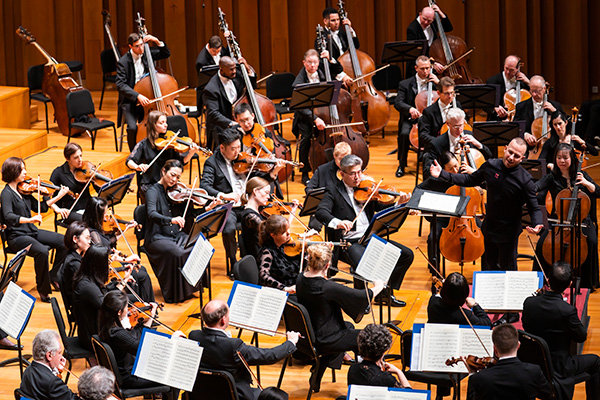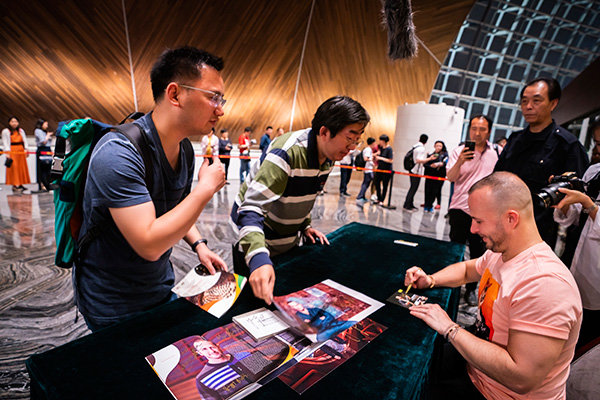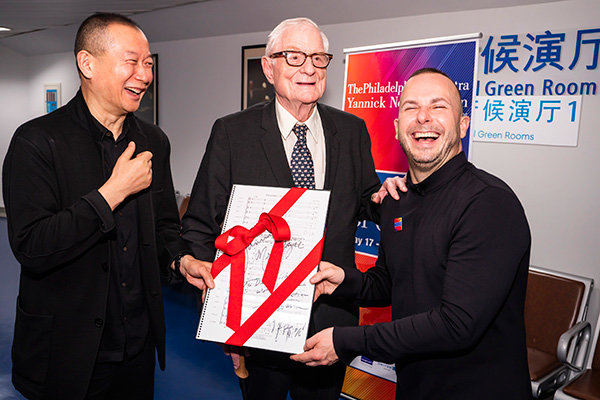
Under the baton of Yannick Nezet-Seguin, the Philadelphia Orchestra is touring Chinese cities, marking the 40th anniversary of the establishment of diplomatic relations between China and the United States.[For China Daily]
The Philadelphia Orchestra has made many trips to China since its first visit in 1973, but amid trade tensions, this year's tour is special.
When Yannick Nezet-Seguin, music director of the Philadelphia Orchestra, packed his bags for his trip to China with the orchestra, he included a pink T-shirt with a picture of a little shiba inu on it.
"I knew we would meet lots of Chinese audience members, especially the younger ones, at CD-signing events during the trip, so I put on this lovely T-shirt," said Nezet-Seguin, who is in his seventh season as the music director of the Philadelphia Orchestra, at the National Center for the Performing Arts in Beijing on Friday.
Over the past 11 years, he has returned to perform in China six times. He is now accompanying the Philadelphia Orchestra on its 12th tour of China from May 16 to Tuesday, in Beijing, Tianjin, Hangzhou, Zhejiang province, Nanjing, Jiangsu province, and Shanghai.
Since becoming the first US orchestra to perform in China in 1973, the Philadelphia Orchestra has returned to China in 1993, and again in 1996, 2001, 2008, and 2010, when it played at the opening of the World Expo in Shanghai, prior to return visits in 2012, 2013, 2014, 2016 and 2017.
What makes this tour special is that it marks the 40th anniversary of the establishment of diplomatic relations between China and the United States. The tour is also taking place during a time of uncertainty between the two countries due to trade tensions.

Yannick Nezet-Seguin (seated) signs CDs after the performance at the National Center for the Performing Arts in Beijing on May 17. [For China Daily]
"What is happening in the world at the moment has no special significance. We just plan to continue this beautiful relationship we have enjoyed with China over the past 40 years," says Nezet-Seguin. "I am very proud that the Philadelphia Orchestra has forged such close ties with China. It's just the continuity of us believing that music is a force that unifies people — when words stop, music starts. Music can express what we cannot express with words. That's why music is the language that crosses all boundaries."
For its ongoing China tour, the Philadelphia Orchestra chose a repertoire that includes Beethoven's Symphony No 6, which was performed during the 1973 visit, Schubert's Symphony in C major, Sibelius's Symphony No 2 and Rachmaninoff 's Rhapsody on a Theme of Paganini featuring Chinese pianist Zhang Haochen.
The orchestra is also staging the world premiere of Oscar-winning composer Tan Dun's vocal concerto, The Deer of Nine Colors, which features Chinese soprano Lei Jia.
"The repertoire represents the orchestra at its best. I am proud to lead the orchestra in playing sounds from both the past and present, like this new piece by Tan Dun," Nezet-Seguin says.
As well as the concerts, the orchestra will also connect with Chinese audiences through residency events, which will range from open rehearsals and side-by-side concerts to master classes with students and pop-up performances.
These activities were initiated in 2012 with the help of Nicholas Platt, a former US ambassador, who facilitated the orchestra's 1973 tour. Platt is still a consultant for the orchestra and regularly accompanies the musicians on their trips to China.

From left: Composer Tan Dun, former US ambassador Nicholas Platt and conductor Yannick Nezet-Seguin. [For China Daily]
"There is a growing number of middle class people in China who love music, can afford to buy tickets and encourage their children to learn about music by taking piano or violin lessons. Compared to the old days in 1973, there is a whole new audience," says Platt, 83, in Beijing. "We wanted to create something that was part performance and part cultural exchange."
Recalling the historic trip made by the orchestra to China in 1973, a year after the former American president Richard Nixon visited Beijing on a trip that signaled the resumption of formal relations, Platt — who was 36 years old then — was apprehensive about the job he was assigned to do.
"If any mistakes were made, there would be serious consequences," recalls Platt. "It was one of the major themes in my life. It started my relationship with the orchestra, which has lasted all these years."
He also mentions that the 1973 trip the orchestra made to China had a lasting impact on Chinese music lovers. One of them was Tan Dun, who was just 16 years old when he heard the concert broadcast live on radio. The concert changed his views about music and inspired him to dedicate his life to mixing Western and Chinese musical traditions.
"Tan Dun told me the story about 15 years ago and I was very impressed," says Platt.
Platt returned to Beijing in January to make arrangements for this year's China tour. He was also worried about whether the trade tensions were going to be a problem.
"The Chinese side made it clear that it would not be a problem and the orchestra was welcome to come back to play. Our government had no problem with this from the outset. That's the significance of it," Platt says.
"Today, when growing tensions and disagreement mar other aspects of the US-China relationship, the orchestra's 40-plus years of trusted partnership are helping to keep the two peoples together," he adds.

